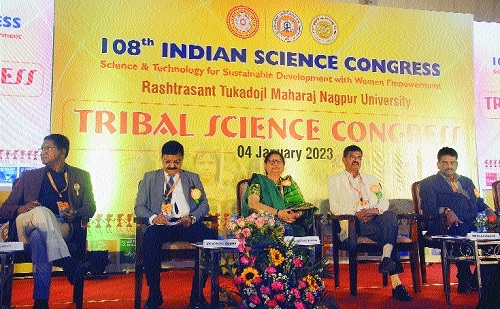1st Tribal Science Congress highlights tribal wisdom and issues
05 Jan 2023 09:24:56

Staff Reporter
“The tribal communities have preserved biodiversity, and conserved natural resources. The techniques developed by them should be utilised in agriculture and drug manufacturing. The scientists should work in this direction,” appealed Dr Vijaylaxmi Saxena, General President of the Indian Science Congress Association (ISCA).
Dr Saxena was speaking after inaugurating the first Tribal Science Congress organised on the sidelines of the ongoing 108th Indian Science Congress, at Rashtrasant Tukadoji Maharaj Nagpur University (RTMNU) campus here on Wednesday. Dr Sanjay Dudhe, Pro Vice-Chancellor, RTMNU; Dr Raju Hiwase, Dean; Dr A Ramkrishna, General Secretary, ISCA; and Dr Sham Koreti, Convener of Tribal Science Congress, also shared the dais on this occasion.
In her speech, Dr Saxena said that India had more than 700 tribes and their rich dialects. They have contributed immensely in India’s freedom struggle, and have conserved water resources, forest, and land. As a mark of recognition, the ISCA had organised Tribal Science Congress for the first time, she added. Other dignitaries also addressed the gathering. During the day-long proceedings of the Tribal Science Congress, various sessions were conducted.
In a session held in the Shaheed Birsa Munda Hall, symposium on ‘Challenges in Development of Tribals’ was held. P Lal, former Vice-Chancellor of Nagaland University, chaired the symposium. Prof Vinod Bala Taksak from M D University, Rohtak; Dr Hemlata Wankhede, Principal of Government Science College, Chamorshi (Gadchiroli); Dr Prakash Halami, Researcher, CSIR-Food Technology Department, Mysore, were the speakers.
The speakers highlighted the tribal wisdom and issues faced by the tribes. They unanimously pitched for utilising the strengths of tribal communities and boosting them with science to accelerate their all-round development. P Lal especially highlighted that tribes in Nagaland were taking 650 spices items. They ensure production of 400 MT of honey every year, and the efforts are on to increase this to 500 MT per annum by the year 2030, he added.
Non-Timber Forest Produce like gum plants, oil seeds, flowers, medicinal plants and edible products like Mahua, Jamun, Mango, Tamarind, and Amla were the highest income contributors in tribal households. Access to these resources form the backbone of financial self-sufficiency of tribal women in Maoist-affected Gadchiroli district of Maharashtra. Empowering them to become decision-makers is the key to mitigating tribal distress issues like malnutrition, maternal and child mortality and poverty, said Dr Hemlata Wankhede.
Dr Arti Prasad and Prof Geetanjali Dash also delivered technical lectures.
As part of the Tribal Science Congress, a special session was arranged on start-up and career guidance for tribal youth, which received overwhelming response. Ravindra Thakre, Additional Tribal Commissioner; Dr Prashant Bokare, Vice-Chancellor, Gondwana University; Sanjay Nathe of Rojgar Noukri Sandarbha, and other experts guided the students. Aditya Shah, 14th descendant of Gond king Bakht Buland Shah, founder of Nagpur City, hailed the meet. Prof Hina Nagbhire and Dr Santosh Girhe conducted the meet.
‘Gujarat Sports varsity to train 50 students of RTMNU’
Dr Arjunsinh Rana, Vice-Chancellor, Swarnim Gujarat Sports University, announced on Wednesday during the Tribal Science Congress that this university would train 50 identified students of RTMNU to make them sports professionals.
Addressing the gathering, Dr Rana said that tribal students should make a choice in sports science and physical education. “Many students naturally gifted with sports traits are not groomed and leave sports midway. Keeping this in mind, we have identified 50 students from RTMNU, to be trained at Swarnim Gujarat Sports University, to produce sports professionals,” he said.